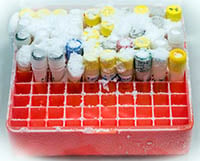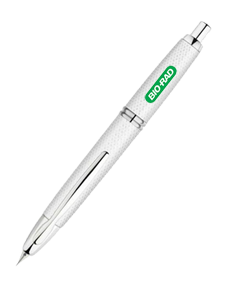
Popular topics

-
References
Powell K (2020). Orderly Desk, Orderly Mind. Nature. 577, 442.
Vohs K et al. (2013). Physical Order Produces Healthy Choices, Generosity, and Conventionality, Whereas Disorder Produces Creativity. Psychol Sci. 24, 1860-1867.
4 Ways to Organize Your Way to Better Science

A photograph of Einstein’s office taken on the day he died shows a messy, disorganized desk with papers piled high. During his lifetime he was asked about his cluttered office and he is quoted as saying “If a cluttered desk is a sign of a cluttered mind, of what then is an empty desk a sign?”.
In 2013, a psychology study examined how creative people were in different environments and found that participants that were placed in a messy surrounding generated consistently more creative ideas (Vohs et al. 2013). Indeed, many successful entrepreneurs including Mark Zuckerberg and Steve Jobs have been photographed working in untidy offices further fueling the notion that messiness may lead to creativity and genius.
When it comes to life scientists though could a more organized approach lead to better results? Carla Shatz, Director of the Stanford Bio-X Centre, Stanford University, USA, seems to think so. In a recent article for Nature she says that “The order of my desk symbolizes an orderly mind”. When discussing her approach she tells Nature that: “…the best science is done when people are extremely careful and precise” (Powell 2020).
Precision is certainly important in science as your results will only be as good as your experimental set-up. Taking extra care and spending a little longer planning and setting up experiments will save you time and money in the long run. Being methodical in other ways can also assist your productivity. Here are our top tips to help you be more organized and do the best possible science:
-
Establish a System for Saving Results
Over the course of your research, you will generate a lot of data. You should develop a logical way to file your findings early on to allow you to locate your results quickly when needed. This will save you time and frustration whenever you need to do thesis amends or address reviewers’ comments for example. Ensuring that any raw data can be easily found will also help your current group if you move to a different lab as you'll be able to help your group quickly locate any data needed for papers. Have a consistent approach to naming files and ensure you record the revision every time you amend finals so you know which one the final version is.
Don't forget to backup your files regularly so that if the unexpected happens and for example, your laptop gets stolen, or your files get corrupted your data is still safe.
-
Keep an Orderly Lab Book
Taking a little bit of extra care when recording your research can save you a lot of time trying to figure out later what you did if you need to refer to the results in the future. Your notes may make sense to you now but will they when you need to write up your thesis or research paper many years later?
Write legibly and always keep your lab book up-to-date so that you have a permanent record of all of your research. Making entries clear and complete will mean that your experiments can easily be repeated by someone else if necessary.
Ensure that you always write out experimental conditions in full and make a note of which antibodies (including clone, supplier, and any other relevant info) and other reagents that you used. Keep track of when you make any changes to experimental conditions so that if needed you can spot any differences they make to your results.
-
Organize Journal Articles and Notes Sensibly
If you have ever read a really interesting journal article and then months later tried to remember exactly where you saw that fascinating result, you will know how frustrating it can be to try and find it again. It is even more frustrating when you need to reference a specific article when writing results up. Rather than having piles of papers on your desk, file them sensibly, such as alphabetically or by project, so that you can easily refer to the papers again when needed. It is a good idea to separate out papers that you haven’t yet read from those that you have, as a reminder to read them.
There are many available electronic reference managers that can help you file downloaded journal articles and also enable you to annotate PDFs with your thoughts. Many of these are often available for free through your research institution and are worth considering if you prefer to limit how much you print.
-
Keep Track of What’s in Your Freezer
 Knowing what and where the reagents are in the freezer, will prevent wasting time rummaging around to check whether you have the antibody that you need. Leaving the freezer door open for too long not only wastes energy but could also be detrimental to your reagents. If you don’t already have one, consider keeping a spreadsheet that tells you the precise location in the freezer of your antibodies, for example, shelf, box, and position. That way you only need to remove the box(es)/ vial(s) that are required and can limit how long you are in the freezer for and avoid drastic temperature changes.
Knowing what and where the reagents are in the freezer, will prevent wasting time rummaging around to check whether you have the antibody that you need. Leaving the freezer door open for too long not only wastes energy but could also be detrimental to your reagents. If you don’t already have one, consider keeping a spreadsheet that tells you the precise location in the freezer of your antibodies, for example, shelf, box, and position. That way you only need to remove the box(es)/ vial(s) that are required and can limit how long you are in the freezer for and avoid drastic temperature changes.
Remember to make a note of when stocks are running low so you can reorder in plenty of time to prevent delays in carrying out experiments.
Are You Guilty of a Cluttered Desk?
Even if you think that like Einstein clutter helps your creativity, adopting other organizing practices such as cataloging your findings in a logical way, can help improve the productivity of the entire lab. Why not give some of our ideas a try and see if they aid your efficiency and help you do the best possible science.
References
Powell K (2020). Orderly Desk, Orderly Mind. Nature. 577, 442.
Vohs K et al. (2013). Physical Order Produces Healthy Choices, Generosity, and Conventionality, Whereas Disorder Produces Creativity. Psychol Sci. 24, 1860-1867.
You may also be interested in...

View more Feature or Tips&Tricks blogs















